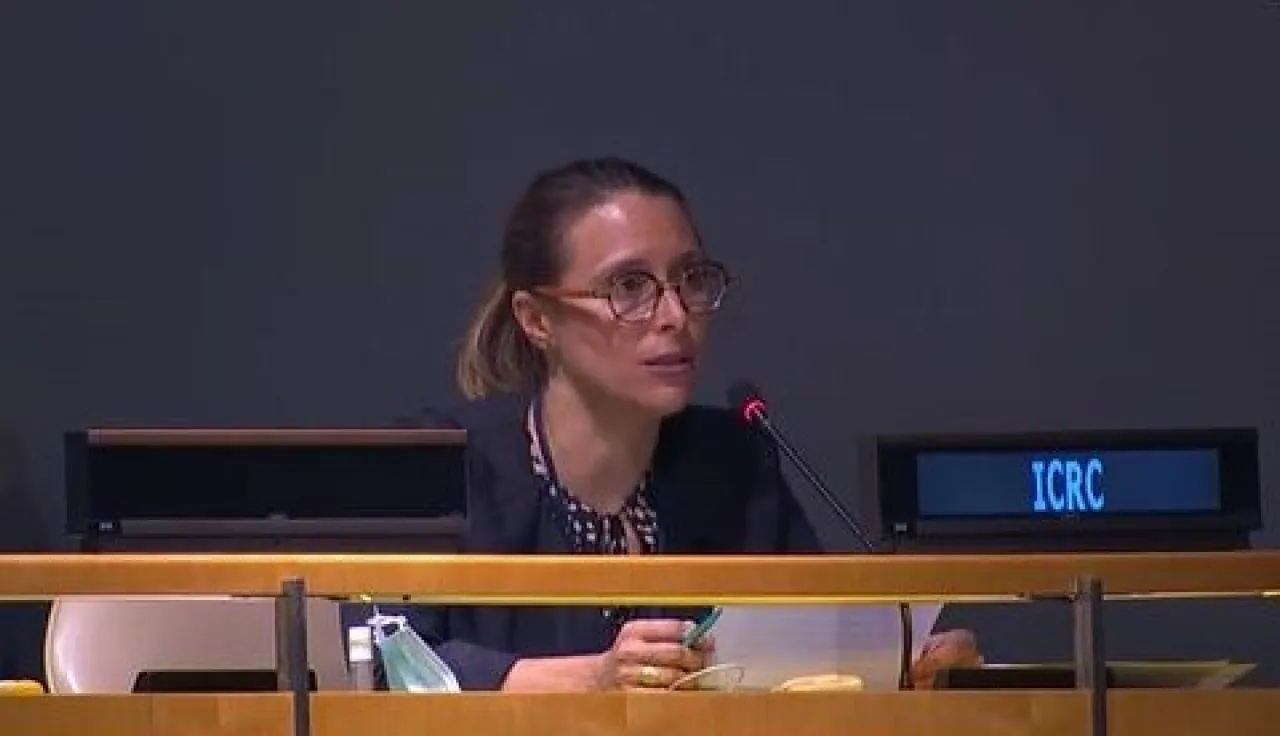As delivered by Ms. Laetitia Courtois, Permanent Observer to the UN and Head of Delegation, ICRC New York
President,
2020 has been a year unlike any other in recent memory. States, international and local organizations, the private sector, and communities the world over are dealing with the staggering impacts of a pandemic which is still unfolding.
The pandemic has exacerbated humanitarian needs, exposing individual vulnerabilities and pre-existing systemic fragilities – including in health systems weakened by conflict. We already know that the pandemic is impacting important health activities, leading to back-sliding, for example on routine immunization against other diseases. But it has also shown vividly how in places where people already face compounded vulnerabilities, the nature and impact of a pandemic is immediately multifaceted – with health, social, economic, protection and political dimensions. The broad destructive trends that existed before COVID – including intensifying conflicts, climate change, rising inequality, protracted displacement – remain. And this will stay with us, making systemic responses even more essential. What we put off today will be more entrenched tomorrow.
Further, many of the people we serve in affected communities express concerns that are far away from the pandemic as solely a health issue. Protracted displacement due to expanding hostilities and rising instability, the inability to access basic services; these are the issues that communities affected by crises often identify as their more immediate concerns. We must ensure that people are supported to deal with shocks to their well-being, livelihood and aspirations regardless of who they are and where they live.
At the heart of this is a question of dignity. The dignity that comes when a parent doesn't have to choose between medical care or food for their children. The dignity in quality education for girls and boys even amid conflict and violence. The dignity in ensuring access to appropriate physical and mental healthcare without discrimination.
What steps can we take as the crisis continues for 2021? The ICRC would like to offer some recommendations for States.
First, States must meet their commitments and obligations to support principled humanitarian action, including in the most complex contexts. For instance, preserving humanitarian access requires well-crafted humanitarian exemptions in counter-terrorism and sanctions provisions, so that humanitarians can reach those in need and remain close to affected people. The impartial delivery of assistance enables organizations like the ICRC to build and sustain relationships of trust over the long term, trust with affected populations and with all parties to conflict. Trust and humanitarian access will be essential to ensure COVID-19 vaccines – as well as routine vaccinations – reach all those in need, particularly in areas where States may not be able to reach them.
Second, States must ensure that in the pandemic response and beyond, those delivering vital health services can carry out their work without fear of attack, discrimination or stigma. Between February and August alone, ICRC delegations monitored 650 reports of incidents of violence against healthcare linked to COVID-19 – and this figure represents but a fraction of the actual number of incidents. The rules of international humanitarian law are very clear: medical personnel and medical facilities performing their exclusively humanitarian functions must be respected and protected at all times. Not only belligerents but also civilians must refrain from violence against patients and medical care providers. Furthermore, in line with their obligations under human rights law, States must not interfere, directly or indirectly, with access by people under their jurisdiction to healthcare.
Third, whether during peacetime or in armed conflict, the healthcare sector is also particularly vulnerable to cyber harm. We do not accept attacks on physical health infrastructure and we should not accept such attacks in cyberspace. Such attacks endanger human lives by impairing the ability of healthcare facilities to function and by disrupting the delivery of care to patients. We call on States to affirm unequivocally that cyber-attacks against medical infrastructure are unacceptable and unlawful, and to take action to stop those attacks.
Fourth, we – States and humanitarians – must use this once-in-a-generation disruptive event to reflect, adapt and innovate to improve responses. We see the pandemic accelerating digital delivery of humanitarian services, such as mental healthcare responses. But transformation carries risks alongside benefits: we urge concrete action by States, humanitarian organizations and service providers on effective data protection – and on online misinformation, disinformation and hate speech. Humanitarian protection obligations must be made real in the digital sphere.
Finally, States should support humanitarian action beyond short-term paradigms. The pandemic has lent new gravity to the understanding that we must address humanitarian challenges comprehensively and with a longer-term perspective which focuses on building resilience – of systems and of the communities that depend on them. As attention turns to the post-COVID recovery, we urge States and international finance institutions to ensure that people and communities living in areas affected by conflict, fragility and violence are served by financing that recognizes and meets their needs, and that strengthens their essential services.
The ICRC is ready to assist States in fulfilling their commitments under international humanitarian law, and their humanitarian obligations – as well as to keep delivering for affected people.
I thank you.




